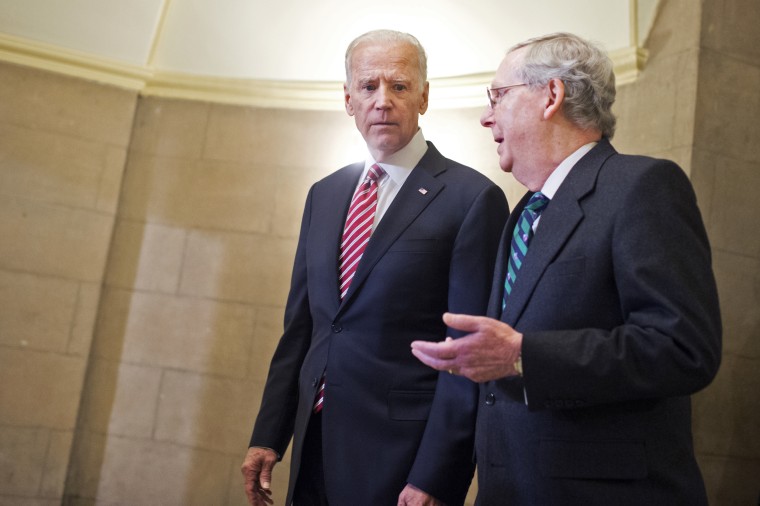In 35 days, Georgia will hold two U.S. Senate runoff elections, and the stakes couldn't be much higher: if the Democratic candidates prevail in both contests, there will be a Democratic-led Senate working alongside Joe Biden's White House and Nancy Pelosi's U.S. House.
If, however, at least one of the Republicans wins, Senate Majority Leader Mitch McConnell (R) will keep control of his chamber. Jon Ossoff (D), taking on incumbent Sen. David Perdue (R) in one of Georgia's two races, told CNN over the weekend, "[W]e all know what's going to happen if McConnell holds the Senate. He will try to do to Biden and Harris just like he tried to do to President Obama. It will be paralysis, partisan trench warfare, obstructionism as far as the eye can see, at a moment of crisis, when we need strong action."
The Georgian made related comments to the Washington Post's Greg Sargent, specifically emphasizing the need for economic aid.
"If McConnell controls the Senate, he's going to block the kind of relief package that we need," Ossoff told me. "And that means not just short-term, direct economic relief, but also the kind of infrastructure-jobs-clean energy program necessary to support long-term recovery." ... "This paralysis of our government in the midst of a crisis is untenable," Ossoff added. "People are suffering, and they want government to work."
On the surface, it's interesting to see the Democratic Senate hopeful try to nationalize his race in unexpected ways. But just below the surface, Ossoff is pushing back against the misguided assumption that divided government -- both parties sharing power, with control over rival institutions -- will lead to "moderation" and bipartisan compromises.
Indeed, Maryland Gov. Larry Hogan (R) wrote a piece for the conservative Washington Examiner yesterday, endorsing both of the Republicans in Georgia's runoff elections, not because he thinks they're good at their jobs -- the governor barely even mentioned Perdue or Kelly Loeffler in the column -- but because he believes "balanced government" and "divided government" leads to "common-sense solutions."
I would love to introduce Larry Hogan to Mitch McConnell.
The fantasy of bipartisan governance certainly sounds pleasant enough, but the idea that the GOP majority leader will willingly work with the Democratic White House in a constructive way is not to be taken seriously. As regular readers know, we need only look at McConnell's actions during Barack Obama's presidency to get a sense of how the Kentucky Republican approaches his governing responsibilities.
As I noted in my book (see the first chapter), after Obama was inaugurated in 2009, Republicans were under some pressure to be responsible and constructive, with many pleading with GOP officials to resist the urge to slap away the Democratic president's outstretched hand. McConnell executed a different kind of plan, refusing to even consider bipartisan governing, even when Obama agreed with his opponents.
As the Kentuckian saw it, the public believes bipartisan bills are popular, so he rejected every element of the Democratic White House's agenda so voters would not see Obama succeeding. "We worked very hard to keep our fingerprints off of these proposals," McConnell told The Atlantic in 2011, referring to legislation backed by the White House.
He was surprisingly candid on this point. "Public opinion can change, but it is affected by what elected officials do," the GOP leader told National Journal in March 2010. "Our reaction to what [Democrats] were doing had a lot to do with how the public felt about it. Republican unity in the House and Senate has been the major contributing factor to shifting American public opinion."
In other words, McConnell felt like he'd cracked a code: Republicans would make popular measures less popular by killing them. McConnell's plan was predicated on the idea that if he could just turn every debate into a partisan food fight, voters would be repulsed; Obama's outreach to Republicans would be perceived as a failure; progressive ideas would fail; and GOP candidates would be rewarded for their obstinance.
McConnell added soon after, in reference to his party's approach to policymaking, "The single most important thing we want to achieve is for President Obama to be a one-term president.... Our single biggest political goal is to give our nominee for president the maximum opportunity to be successful."
This is the senator's vision. It is not a secret. There is no subtlety. As a Democrat prepares to enter the Oval Office, McConnell has a guiding principle: Failure is the goal. His priority will be to expand the GOP majority in the Senate in 2022, and then elect a Republican president in 2024. Working constructively with a Democratic White House would do little to advance these objectives, which is precisely why he will choose a maximalist partisan course: because gridlock and dysfunction will give McConnell more of what he wants.
To assume that a Republican-led Senate would work with Biden in good faith toward centrist compromises is to overlook literally everything we know about Mitch McConnell.

